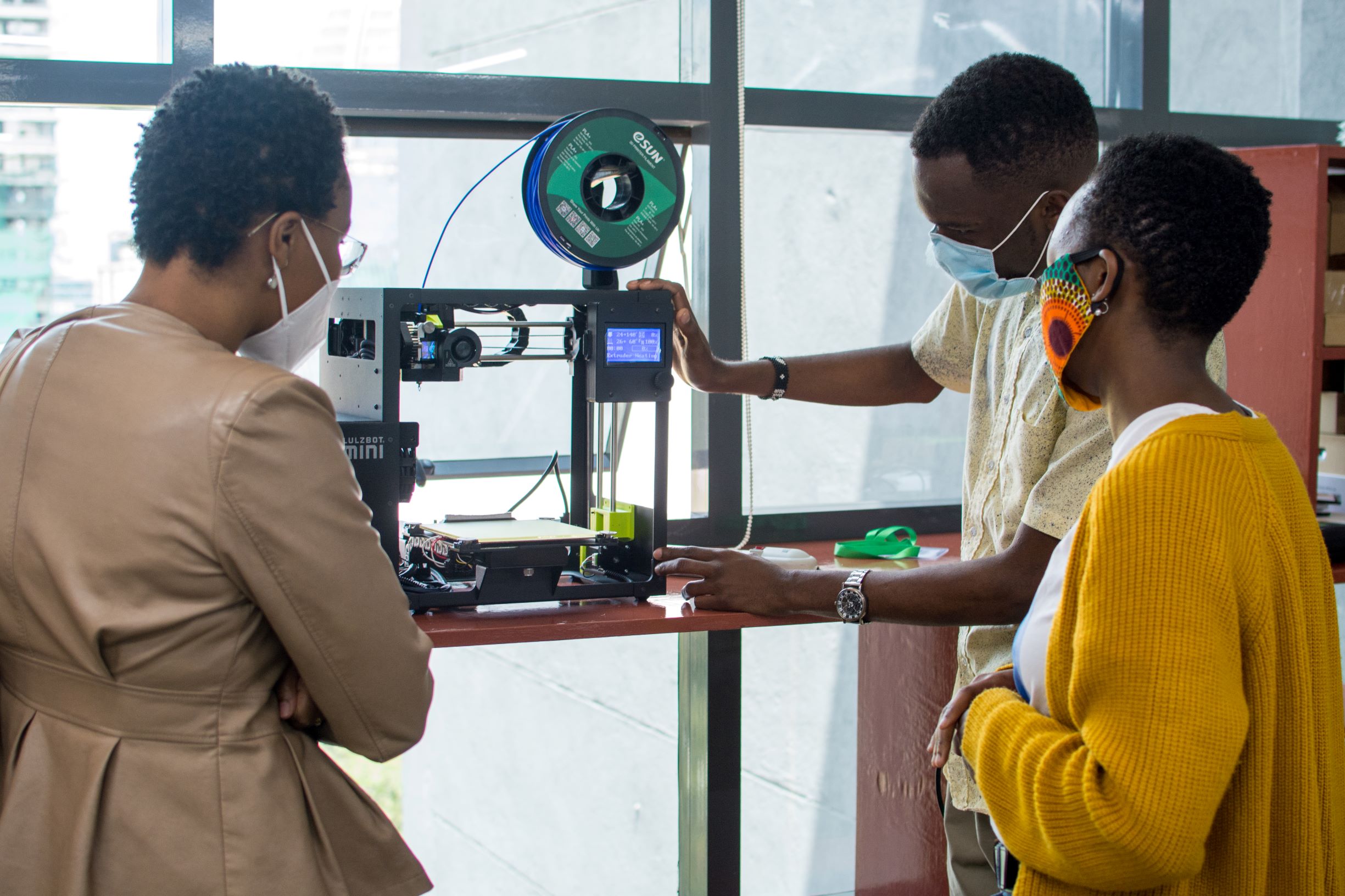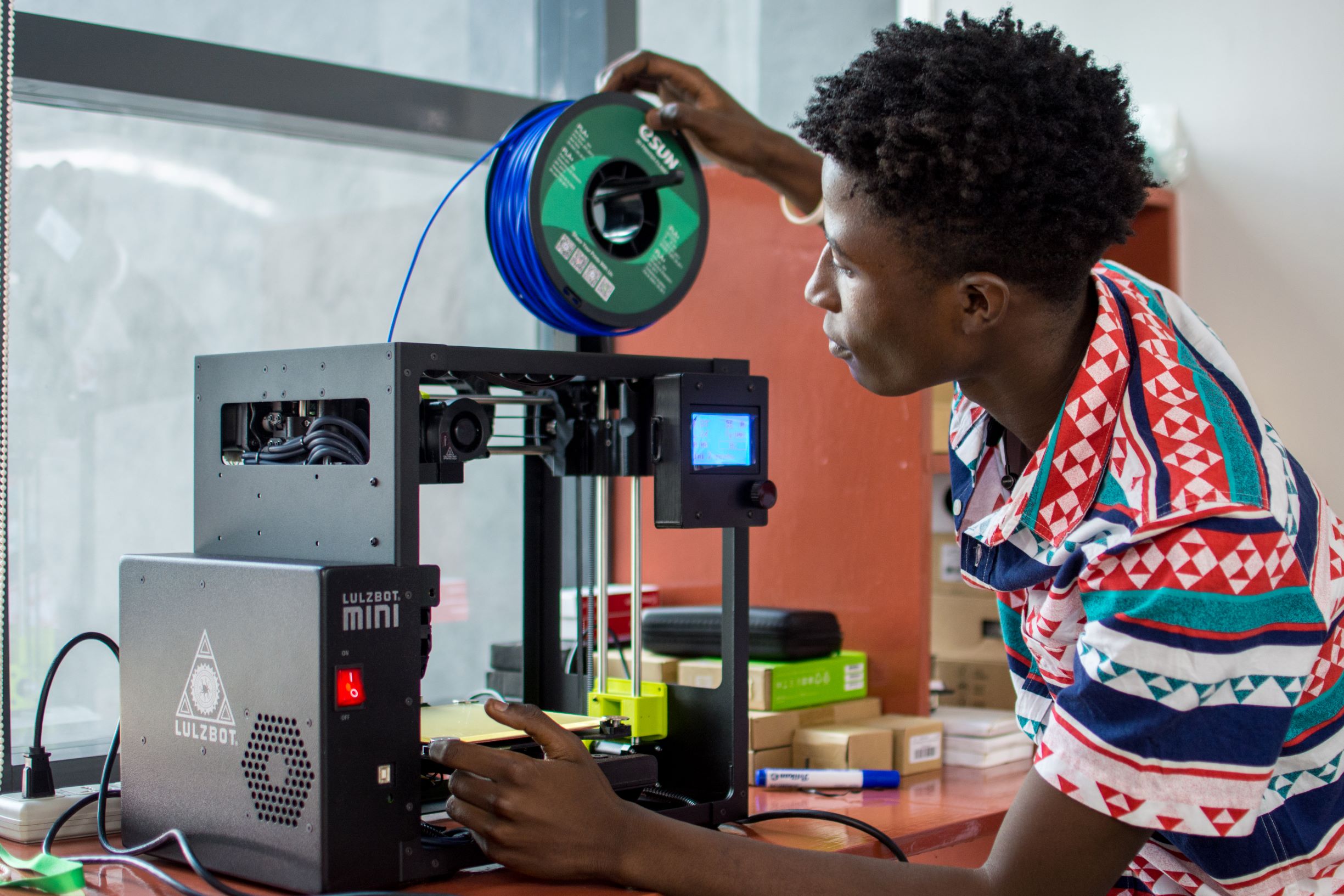Low-cost innovation in the Silicon Savannah to combat COVID-19
Authored by Lillian Njoro, Head of Experimentation, UNDP Accelerator Lab Kenya.
Kenya is a globally recognised hub of innovation, dubbed the Silicon Savannah for having one of the fastest growing technology and innovation ecosystems. Yet, innovators in Kenya still face several challenges, such as accessibility to funds, while navigating the innovation ecosystem at large.
In the face of these barriers, Kenyan innovators, particularly young people, continue to display resilience, creativity and ingenuity to get their ideas off the ground. This has become more evident in light of the COVID-19 pandemic where we have witnessed a myriad of home-grown solutions to contribute to the pandemic response.
Recently, a group of young innovators came together to build low-cost working prototypes to mitigate the effects of the pandemic. These prototypes were winning submissions that had come out of the COVID-19 Detect and Protect innovation challenge -launched in April by UNDP, Hackster.io (the world’s largest online open-source technology hardware community) and a number of global tech partners.
This was a call to action for product designers, scientists, hackers, software developers and inventors worldwide to design low-cost, open-source solutions specifically for developing countries. Most of the prototypes cost less than USD 10 to build.

COVIDMakerthonKE
To kickstart implementation, the global UNDP-Hackster partnership supplied equipment and materials to UNDP country offices through the Accelerator Labs network so that these offices could work with local communities to build some of the winning solutions. Equipment included 3D printers, components, microcontroller units and more, to support the testing and implementation of the innovations at a country-level for rapid learning, experimentation, and potential scaling.
In Kenya, the UNDP Accelerator Lab worked closely with local Hackster.io ambassadors Clinton Oduor and Kelvin Kang’ethe to organise a COVID-19 Makerthon, hosted in Nairobi at iHub, a tech hub embedded in the Kenyan innovation ecosystem. The three-week Makerthon brought together local inventors and innovators to bring to life the designs of the low-cost tech solutions through a collaborative build and assembly process. “The COVIDMakerthonKE provided the platform to share ideas with local makers and hackers and also utilize the global open source community of hardware and software to rapidly come up with low-cost innovations in efforts to fight the COVID-19 pandemic,” said Oduor.
The three tech solutions that were prioritised for assembly and testing were selected based on their relevance to supporting public health efforts in addressing COVID-19:
- Touchless hand faucet: an automatic hands-free sanitiser/water dispenser to make regular hand-washing safe and simple.
- IR contactless thermometer: a low-cost thermometer that doesn’t require the user to touch it.
- Pulse oximeter: a non-invasive device to measure the amount of oxygen in the bloodstream – a particularly useful diagnostic tool for respiratory illnesses such as COVID-19.
The innovators had the opportunity to adapt the selected innovations and put their own creative spin so as to best reflect the Kenyan context and needs for the COVID-19 response. “This initiative is an opportunity for me to collaborate with other changemakers to positively impact our communities,” said Kang’ethe.
One of the key learnings during the Makerthon was the importance of iteration during the rapid prototyping phase. The innovators worked closely as a team to quickly build, test, and refine the solutions to better adapt to specific contexts by using human-centred design thinking concepts. This experience also shone a light on the importance of strengthening the open source community to encourage more innovators to make contributions in the hardware and software space. These can then be accessed by everyone to further learning and innovation.
In line with this, UNDP Accelerator Lab Kenya helped draw up an agreement between iHub and the Hackster ambassadors to donate the 3D printer for a period of three months to be freely accessed by interested innovators. The aim was to support more youth in the local innovation and maker spaces, a key priority for the global partnership of UNDP and Hackster.io.

Supporting Kenya’s local innovation ecosystem
For countries such as Kenya, the low cost of technology can be important. One of the biggest challenges faced by early-stage innovators and entrepreneurs is the accessibility of funds to scale up their innovations. “There is a lot of talent that is going to waste, where a lot of world-class innovations by young Kenyans are abandoned at the ideation and prototyping stages due to funding constraints to take their innovations to the next level,” Odour noted.
Kang’ethe added that the cost of fabrication is still high and that there are challenges in accessing all the equipment required for prototyping within the existing maker spaces. This inevitably leads to over-reliance on imported materials.
At the core of the innovation challenge, there is a clear narrative of innovators, entrepreneurs and bright minds coming together to learn, build and test together, while also doing something good for their community. What’s more, the winning solutions all had to be low-cost, to remove any barriers around building them quickly and cheaply in any setting.
There is much potential for open innovation to help Kenya’s innovation ecosystem to grow and thrive. Already, the rise of this Silicon Savannah has been marked by key milestones in the country such as the development of mobile money technology (M-Pesa), a global crowdsourcing platform (Ushahidi), growing tech incubator models such as iHub and strong government commitment to ICT policy and infrastructure. According to Wired, as of 2018, Kenya’s tech scene was worth USD 1 billion, with presence of big tech firms like IBM and Microsoft. Kenya is also home to more than 200 start-ups.
Way forward
With the assembly and build phase now complete, next comes the testing and implementation phase. Over the next few weeks, the assembled devices will be tested in different real-life contexts, such as schools, shopping centres, religious venues, and other public areas. The data collected during the testing phase will be used to validate the usefulness of these innovations and make a case to stakeholders in the innovation ecosystem for further testing and potential scaling.
We hope that this initiative will serve as a lever for strengthening the community of local innovators in the Kenyan hardware and software maker spaces.
* * *
We would like to thank iHub for the support provided during the COVID-19 Makerthon. In order to support more youth in local innovation and maker spaces, the local Hackster ambassadors have donated a 3D printer to iHub for a period of 3 months to be freely accessed by interested innovators and inventors. Feel free to contact iHub if you would like to take up the opportunity.

 Locations
Locations